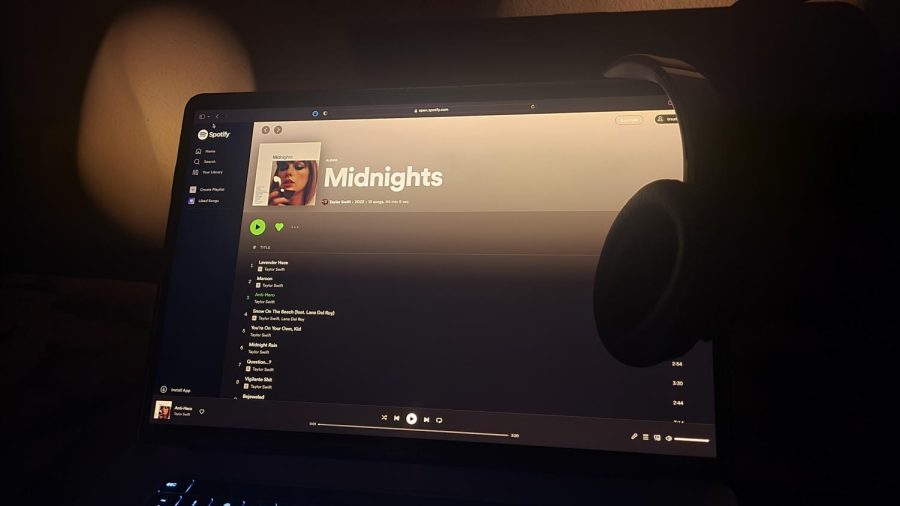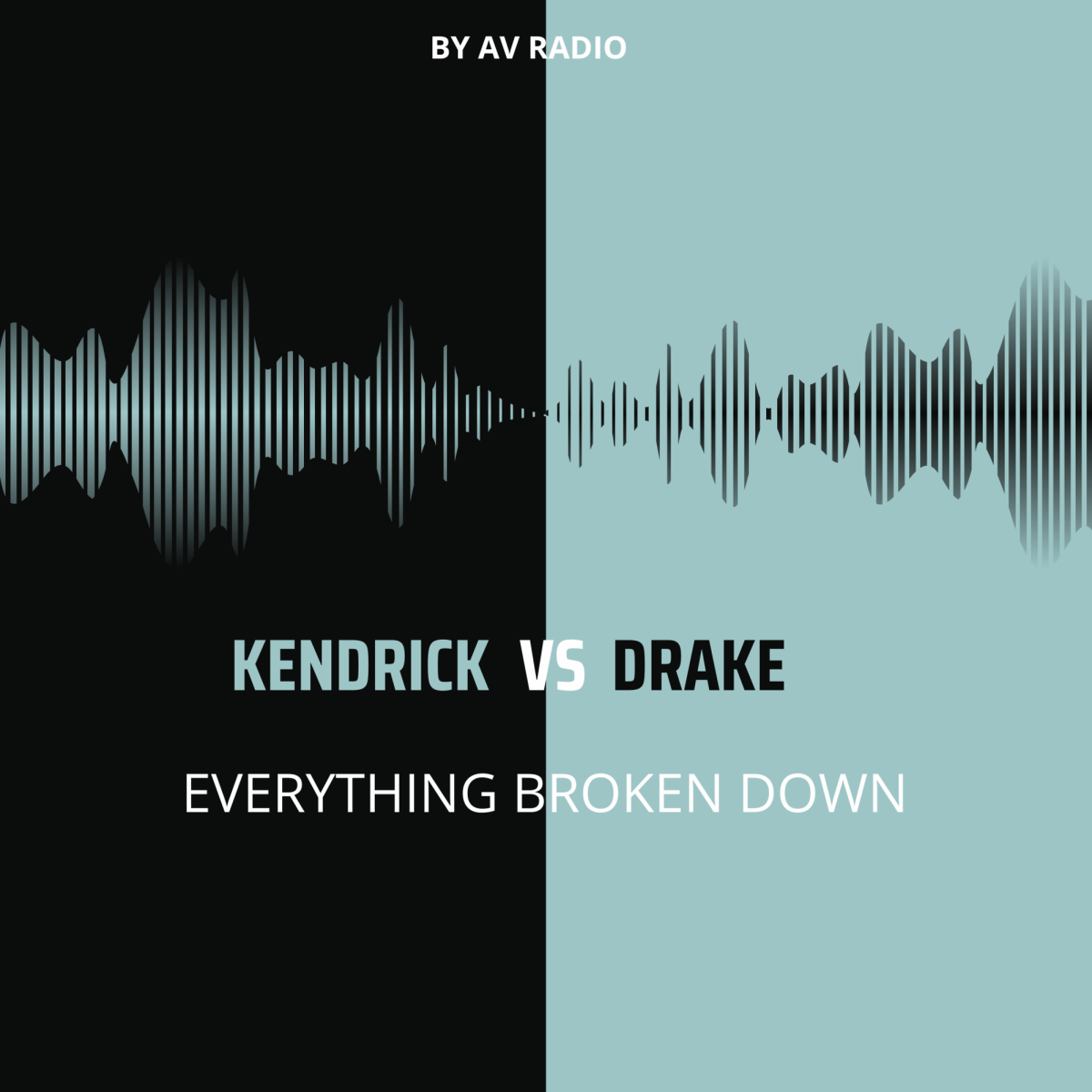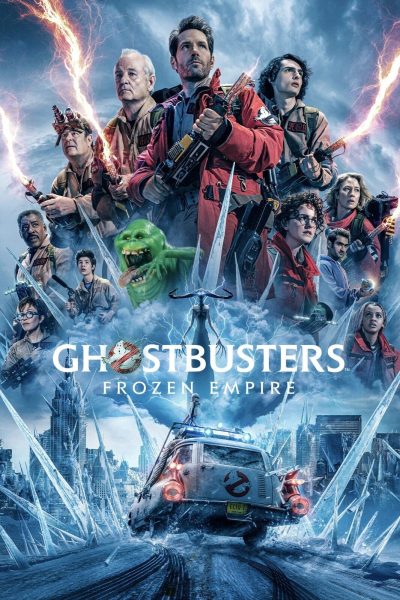Taylor Swift’s Midnights: A musical journey of love, fear, and everything in between
On October 21st at 12 AM EST, Taylor Swift released her 10th studio album, Midnights. As a result Spotify crashed that night.
November 2, 2022
One of the first lessons new Swifties learn is that with Taylor Swift, everything is a mystery to be solved. Through her lyrics or even her jewelry, anything could be an easter egg for an upcoming project.
Midnights was no exception to this pattern of mystery. After announcing the album in August, releasing the track-list through cryptic TikToks, and finally revealing that the album was about “13 sleepless nights,” Swift once again took her fandom down the rabbit hole of conspiring and puzzle-solving. Yet, the biggest question remained unanswered: what were the stories of these 13 sleepless nights, what was Midnights?
On October 21st, we learned it was a return to Swift’s synth-pop prowess, along with seven surprise tracks released at 3 a.m EST. Midnights was written by Swift and features long-time producer Jack Antonoff as her main collaborator.
Album Review:
While Swift never disappoints with her signature style, her lyricism is what makes Midnights a stand-out album. Swift abandons the fictional storytelling she pioneered in Folklore and Evermore. She swivels the spotlight back to herself. Through Midnights, we see her true self, a human being in love, forced to deal with invasive media.
Songs like “Lavender Haze,” “The Great War,” “Paris,” and “Sweet Nothing” encapsulate love best, reminding us that simple things matter most: “Outside they’re push and shoving / you’re in the kitchen humming / I find myself running home to your sweet nothings,” she sings. At the end of the album, Swift understands the importance of guarding her privacy: “The greatest of luxuries is your secrets,” she sings in “Dear Reader.”
But Swift’s 13 sleepless nights weren’t always filled with love and epiphanies. Through songs like “Question…?,” “High Infidelity,” and “Labyrinth,” Swift symbolizes anxiety in relationships. “Uh oh, I’m falling in love again,” she sings. Sonically and lyrically, “Labyrinth” is a possible revisit to “The Archer” from Lover.
In “Would’ve, Could’ve, Should’ve” and “Maroon”, Swift sheds light on heartbreak. Maroon in particular is a likely reference to Red, which encapsulated the most passionate, feverish form of love. Seven years later in Lover, Swift deconstructs this idea: “I once believed love would be burning red / It’s golden,” she realizes in “Daylight.” Through “Maroon,” Swift acknowledges that the relationship wasn’t “burning red,” but wasn’t “golden” either. Maroon’s concept is a darker, more dried-up version of the passion that vanished with the relationship.
Swift’s ability to storytell and build these intricate connections to her discography is what makes Midnights such a unique album. Swift isn’t the type of artist to throw the answers in front of the listener — she wants you to go back, understand the lyrics, and experience the record in a completely different way. Swift even addressed this in Midnights: “I’m only cryptic and Machiavellian ‘cause I care,” she confesses in “Mastermind.”
In “Bejeweled” and “Midnight Rain,” Swift addresses a more nuanced aspect of relationships. A partner has different priorities and doesn’t give her the value she deserves, but she knows her worth. “I made you my world, have you heard? / I can reclaim the land,” she asserts in “Bejeweled.”
“Vigilante Shit” and “Karma” are more similar to Reputation, albeit, the songs themselves are polar opposites: “You did some bad things, but I’m the worst of them,” she sneers in Vigilante Shit. The track highlights low, sultry notes cascading through the strong bass akin to Reputation. “Karma” is a more upbeat version of “Look What You Made Me Do.”
“Glitch” is the opposite sonically. It doesn’t sound like anything Swift has done before, a refreshing addition to the 3 a.m tracks.
And of course, it’s not a Taylor Swift album without Track 5, the most vulnerable song in each record. The lyrics speak for themselves: “I hosted parties and starved my body like I’d be saved by a perfect kiss,” confesses Swift in “You’re On Your Own, Kid.”
“Bigger than the Whole Sky” and “Anti-Hero” are some of the more relatable tracks on Midnights, addressing loss and insecurities respectively: “Sometimes I feel like everybody is a sexy baby, and I’m a monster on the hill,” says Swift. In the music video, her identical “anti-hero” taunts her through the catchy hook: “It’s me / Hi / I’m the problem, it’s me.” Swift mentioned it was inspired by how the media dehumanizes her, and living in the social media age makes “Anti-Hero” one of the more relatable songs on the album.
The only let-down in the album was “Snow on the Beach,” a collaboration between Swift and Lana Del Rey. While I expected Del Rey to get a full verse, her vocals were mostly fused behind Swift’s, taking up the harmonies. There was one moment where her voice came out into the main melody, it was tranquil yet alluring, fitting the song’s cosmic mood perfectly. Hearing more from Del Rey would have taken the track to another level; regardless, it’s a beautiful song.
The Verdict:
Overall, Midnights is one of Swift’s best records. Her ability to tell stories through convoluted, poetic phrases whilst getting the general message across is brilliant, and Midnights does this beautifully. But, just like clockwork, Midnights is an intricate piece of art. Each track contains easter eggs beneath the lyrics, carrying deeper messages far beyond what one sees on the surface. And if that’s what the mastermind herself intends, it all comes together when the clock strikes midnight.















